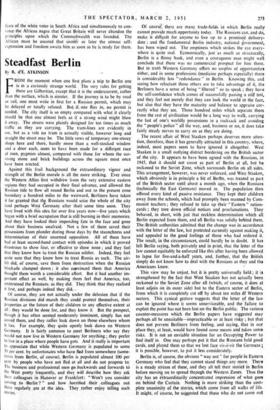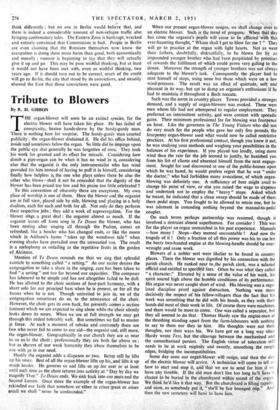Steadfast Berlin
FROM the moment when one first plans a trip to Berlin one is in a curiously strange world. The very rules for getting there are Gilbertian, except that it is the undercurrent, rather than the surface, which is sinister. If the journey is to be by road or rail, one must write in first for a Russian permit, which may he delayed or totally refused. But, if one flies in, no permit is
needed. The city itself is so empty compared with what it clearly should be that one almost feels as if a strong wind might blow
it away. The streets were plainly designed for ten times as much traffic as they are carrying. The tram-lines are evidently in use, but as a rule no tram is actually visible, however long and
straight the street may be. The little rows of temporary one-storey shops here and there, hardly more than a well-stocked window and a door each, seem to have been made for a different race of men, pygmies almost, compared with those for whom the sur- viving stone and brick buildings across the square must once have been erected.
Against this frail background the extraordinary vigour and strength of the Berlin morale is all the more striking. Ever since the Western Allies first withdrew from the very extensive eastern regions they had occupied in their final advance, and allowed the Russian tide to flow all round Berlin and out to the present zone boundary a hundred miles to the westward, Berliners have taken
it for granted that tiv Russians would seize the whole of the city (and perhaps West Germany after that) some time soon. They
have lived with this idea for over five years now—five years which began with a brief occupation that is still burning in their memories. And they have looked their impending fate in the face and gone about their business unafraid. Not a few of them saved their possessions from plunder during those days by the staunchness and determination of their unarmed opposition. All of them have had at least second-hand contact with episodes in which it proved disastrous to show fear, or effective to show none ; and they feel that they know how to treat the Russian soldier. Indeed, they feel quite sure that they know how to treat Russia as such. The air- lift did, of course, save them from destruction when the Russian blockade clamped down ; it also convinced them that America
thought them worth a considerable effort. But it had another im- portant effect as well, by making them feel that America, too, understood the Russians, as they did. They think that they realised it first, and perhaps indeed they did. ,
Of course, they are not actually under the delusion that if the Russian divisions did march they could protect themselves, their properties or the future of their children to any effective extent at all : they would be done for, and they know it. But the prospect, though it has often seemed moderately imminent, simply has not cowed them, and they rather look down on those elsewhere whom
It has. For example, they quite openly look down on Western Germany. It is fairly common to meet Berliners who say they would not now live in Western Germany for anything ; they prefer to live in a place where people have guts. And it really is important to appreciate that while Western Germany is populated to some 30 per cent. by unfortunates who have fled from somewhere (some- times from Berlin, of course), Berlin is populated almost 100 per cent. by people who have not fled at all and do not propose to. The business and professional men go backwards and forwards to the West pretty frequently, and they will describe how they ask their colleagues in Hanover or Frankfurt: " Won't you consider zoniing to Berlin ? " and how horrified their colleagues out there regularly are at the idea. They rather enjoy telling such stories.
Of course'," there are many trade-fields in which Berlin really cannot provide much opportunity today. The Russians can, and do, make it difficult for anyone to live up to a promised delivery- date ; and the fundamental Berlin industry, national government, has been wiped out. The emptiness which strikes the eye every- where is quite real. Economically, just as much as structurally, Berlin is a flimsy husk, and even a courageous man might well conclude that there was no commercial prospect for him there. But in truth Western Germany offers no surplus of opportunities either, and in some professions (medicine perhaps especially) there is considerably less " redundance " in Berlin. Knowing this, and seeing how reluctant those others are to take advantage of it, the Berliners have a sense of being " filtered " so to speak ; they have the self-confidence which comes of successfully passing a stiff test, and they feel not merely that they can look the world in the face, but also that they have the maturity and balance to appraise cor- rectly what they see. Those hundred miles which separate them from the rest of civilisation would be a long way to walk, carrying the last of one's worldly possessions in a rucksack and avoiding the "people's police " all the way, and, business or no, it does take fairly steady nerves to carry on as they are doing.
The recent affair of West Staaken perhaps deserves more atten- tion, therefore, than it has generally attracted in this country, where, indeed, most papers seem to have ignored it altogether. West Staaken is a small outlying district bordering on the British sector of the city. It appears to have been agreed with the Russians, in 1945, that it should not count as part of Berlin at all, but be reckoned to the Soviet Zone, which surrounds Berlin on all sides. This arrangement, however, was never enforced, and West Staaken, which obviously is in principle a bit of Berlin, was treated as part of the British sector until about a month ago, when the Russians (technically the East Germans) moved in. The population then offered every kind of passive resistance. They kept their children away from the schools, which had promptly been manned by Com- munist teachers ; they refused to take up their " Eastern " ration- cards ; they tore down official notices and proclamations. They behaved, in short, with just that reckless determination which all Berlin expected from them, and all Berlin was solidly behind them.
The British authorities admitted that the change was in accordance with the letter of the law, but protested earnestly against making it, and appealed to the good feelings of those who had ordered it.
The result, in the circumstances, could hardly be in doubt. It has left Berlin saying, both privately and in print, that the letter of the law cannot equitably be enforced like this after having been allowed to lapse for five-and-a-half years, and, further, that the British simply do not know how to deal with the Russians as they and the Americans know.
This view may be unjust, but it is pretty universally held ; it is strengthened by the fact that West Staaken has not actually been reckoned to the Soviet Zone after all (which, of course, it does at least adjoin on its outer side) but to the Eastern sector of Berlin, from which it is completely cut off by about ten miles of Western sectors. This cynical gesture suggests that the letter of the law can be ignored where it seems unserviceable, and the failure to exploit the point has not been lost on the Berlin public. The various counter-measures which the Berlin papers have suggested may perhaps all be unsuitable—impracticable or at least risky ; but that does not prevent Berliners from feeling, and saying, that in our
place they, at least, would have found some means and taken some risks. It is not an enviable situation for an Occupying Power to find itself in. One may perhaps put it that the Russians held good
cards, and played them so that we lost face vis-a-vis the Germans ; it is possible, however, to put it less considerately.
Berlin is, of course, the obvious " way out " for people in Eastern Germany who feel that they cannot stand things any more. There is a steady stream of these, and they all tell their storiet in Berlin before moving on to spread thrpugh the Western Zones. Thus the city has an extraordinarily concentrated impression of what goes on behind the Curtain. Nothing is more striking than the com- plete unanimity of the stories, which come from all walks of life. It might, of course, be suggested that those who do not come out think differently ; but no one in Berlin would believe that, and there is indeed a considerable amount of non-refugee traffic also bringing confirmatory tales. The Eastern Zone is bankrupt, wrecked and entirely convinced that Communism is bad. People in Berlin are even claiming that the Russians themselves now know the occupation is doing them more harm than good, both economically and morally ; rumour is beginning to say that they will actually give it up and go. This may be pure wishful thinking, but at least it would not have been met with, even as wishful thinking, two years ago. If it should turn out to be correct, much of the credit will go to Berlin, the city that stood by its convictions, and steadily showed the East that those convictions were good.



































 Previous page
Previous page